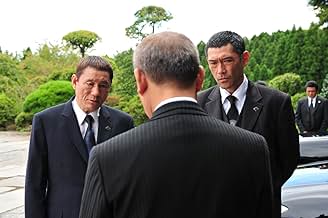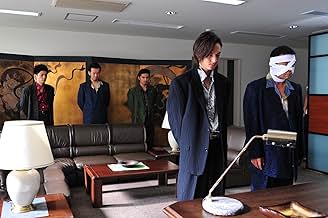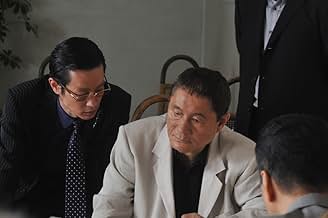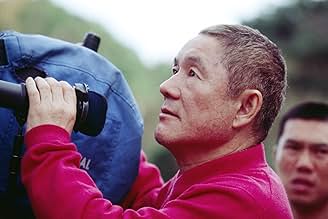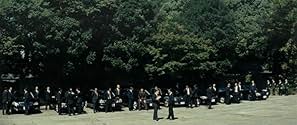O chefe de um clã ordena que seu subordinado bote uma gangue na linha, entre traições e extorsões, nem tudo dá certo.O chefe de um clã ordena que seu subordinado bote uma gangue na linha, entre traições e extorsões, nem tudo dá certo.O chefe de um clã ordena que seu subordinado bote uma gangue na linha, entre traições e extorsões, nem tudo dá certo.
- Prêmios
- 1 indicação no total
- Ôtomo
- (as Beat Takeshi)
Avaliações em destaque
The plot revolves around an internal power struggle within an established yakuza family: a fairly standard trope in gangster films in the East and West. Building on this frame Takeshi piles on a number of events, the sequence characterized by the sort of surreally disconnected quality that I associate with his films. It's difficult to follow causality from one event to the next, and in many cases they seem to operate as interesting vignettes loosely connected through the overarching plot. Some are blackly humorous, some are brutally violent, most are characterized by lots of yelling and cursing in the sort of coarse Japanese that's really difficult for non-native speakers to get. Luckily the plot is simple enough to follow, but I do wonder about missing out on some of the finer details...
The characters are filled out only in broad strokes, and most of the standard types are represented: the godfather-like boss, the loyal lieutenant, the conniving underling, the dundering muscle and so on. Takeshi gets generally excellent performances out of the cast, who manage to come off as sincere and spontaneous. He mentioned in a recent television interview that he shoots most of his scenes in only one or two takes, and the film feels fresh. There's some very good talent here, mostly genre actors but good ones. You develop sympathy for a lot of them by the film's end, which is a mark in its favor.
One of the things I really enjoyed about the film was Takeshi's camera-work, which remains sharp and eye-pleasing as ever. He makes effective use of wide-angle close-ups, and does some great riffs off of Coppola in several scenes. Long pans and still shots are also used well. One that really sticks out in my memory from the beginning of the film is a low, outside shot of a line of black cars, just the rear quarter panels, lined up one after the other traveling down the road. It's an odd shot, but serenely beautiful and effective at conveying a sense of the power and menace of the men inside.
On the minus side, the plot really is simplistic and predictable. Not to the extent of boredom, but once you understand the setup it's not at all hard to imagine how things are bound to turn out. Also, I thought the film felt, on the whole, a bit too clean. The cars in every scene are immaculately polished, every actor is decked out in a neatly arranged designer suit, and every set has all of its props in a neatly prescribed arrangement. It presents a somewhat dystopic, but ultimately whitewashed view of yakuza society that would feel retrograde in a Western gangster film.
Overall, it's nice to see a new yakuza film come out of Takeshi's shop, hallmarked with the same sort of black humor, extreme violence and artistic flair that we've come to expect from this perennial festival honoree. I would, however, have liked to see a bit more of how his intervening films might have affected this genre. Outrage is a good yakuza film, but doesn't do much (enough?) to step outside of its element.
Typically, the topic of yakuza is often shunned. If ever confronted, it is often used to accentuate comedic elements, whilst leaving the truth of the yakuza world unchallenged. However, director/screenwriter/actor Takeshi Kitano goes against the flow and makes a comeback with this feature film after almost a decade long hiatus. Though this is not as well received as compared to other made in Japan films, it has still received much acclamation. Earlier in his directing career, he was already known for "Violent Cop" and "Sonatine", which also dealt with the dark world of yakuza. It is therefore admirable for his efforts to bring forth the most truthful reflection of the dark side of Japan despite the risk of low commercial success. And for this film, he has once again managed to project a somewhat accurate image of the realities in the yakuza scene.
The overarching plot of the film works with the conflicts that could possibly exist in any relationships – malice and greed. It circles the power struggle between the Iketomo-gumi and its affliation Murase-gumi and his sworn brother Otomo (Takeshi Kitano) who has his own crew as well. While Otomo tries to break free from the subordination of the Murase-gumi, they too try to acquire greater power. In this power struggle, they begin to plot against one another and result in sheer violence and torture. In this aspect, Takeshi is quite creative and playful as he invents numerous ways that the characters get tortured or die. As revealed in one of his interviews, he actually came up with these before he wrote the narrative that parallels with the violence. The convincing gore and never-imagined ways to kill and torture; for this you really have to watch it for yourself.
Takeshi has carefully chosen who to cast for this film. He made a point not to repeat any actors who worked with him in his previous yakuza related works. The cast is pretty commendable for they capture the essence of the characters they are portraying, and even are said to get through each scene with only one or two shots. One of the more outstanding actors is undeniably Ryo Kase, who sports fluent English as opposed to the Japrish/Engrish we often associate Japanese with. That being said, the English dialogues between him and the gaijin (foreigner) were rather blunt and funny. This is probably intentionally designed to poke fun and entertain the viewers.
In the technical aspect, Takeshi displays much competence in his camera- work. From wide-angled shots, to close-ups, to long pans and even point- of-view shots; he utilized a variety of these shots to effectively communicate the non-verbal messages. Put simply, you will find it easier to 'get into the mood' as he engages the viewers very much. Also, hallmark of his films is the seemingly abrupt cuts that often do not signal direct causality in the sequences. As the idiom goes, "one man's meat is another man's poison". You will either hate this style or love this style. Though it can get confusing at times, the overarching plot sets a frame for which the sequences happen. Therefore in its fairly organized manner, it sparks brilliance in its narrative.
Overall the film though unconventional, is a careful examination of the selfish desires that deteriorates relationships. Fitted into the yakuza context, this message has an added punch. On a random note, do look forward to the unanticipated twist towards the end!
- www.moviexclusive.com
Takeshi Kitano's return to his familiar stamping ground, the Yakuza, their intrigues, vendettas and highly inventive ways of inflicting extreme unpleasantness on one another, was given less than a stellar welcome by critics at the Festival. A common refrain was that there was nothing new on offer here, no new insights, just a retread of the familiar. Well, they are right, but is that really such a bad thing?
I say no, not when we get tough guys, sharp suits, black humour, extreme violence (you might never want to visit the dentist again), a convoluted plot that is hard to follow but has something to do with rivalry, inheriting the reins of power and inflicting extreme violence on the other team. Oh yes, there's also betrayal and extreme violence.
Outrage is old-school Takeshi Kitano, a (for me) welcome return to his glory days, not that he ever left them behind (I've time for all his films, if not his gameshows). If you like the man, as actor or director, then you won't be disappointed by this film, just as long as you are not expecting something new and different, that is.
Whether you like Takeshi Kitano or not, he sure is good in depicting the yakuza. In the long run this ability got him typecast and he tried to brake the mold in several movies between Brother (2000) and Outrage. For some reason he decided not to pursue his artistic ambition for a while and focus again on Japanese underworld. And this is in no way a step back.
The power struggle between the old boss and his right hand is exquisitely depicted. Without it Outrage would be just another crime thriller with extreme scenes of violence.
The great Japanese director Beat Takeshi returns to the big screen with ¨Outrage¨ dealing with a genre that gave him international recognition and made him one of the best Asian filmmakers , and being Takeshi Kitano's first gangster film in ten years , after Brother (2000) . It is an exciting picture displaying suspense , tension , and interesting gangsters war , though sometimes difficult to follow . There is also a cruel depiction of Yakuza life in the 21st century . The story opens with a striking wide shot of a large group of gangsters dressed in black as their leaders meet , these guys have sworn allegiance to their bosses, but it means little once the bullets start flying . Cold and violent film with a confuse plot , twisted intrigue , grisly killings , thrills , chilling events and colorful images . His stunning long takes can resemble intricate paintings while his characters enjoy little respite from the ruthlessness of the real world . However , it results to be a little bit boring , including with no sense dialogs and some embarrassing situations adding brutal murders . Following a string of unconventional , commercially unappealing films, Takeshi Kitano engineered this film specifically as commercially appealing, going back to the genre which brought him the most success, and going as far as imagining the death scenes first and writing a story around them later .
The motion picture was professionally directed by Takeshi Kitano in his peculiar style , being his first film shot in 2.35:1 format . Since his 1989 directorial debut, Kitano has written, directed, edited or starred in almost a film per year without losing the momentum of his originality and heightened artistic sensibility. The extraordinary success of 1997's Hana Bi confirmed Kitano's place as a leading figure of international cinema , here offered remarkable visions of violence and beauty . Among its numerous awards, "Hana-bi" or ¨Fireworks¨ won Venice Film Festival's Golden Lion and was named Best Non-European Film by the European Film Academy . In 2000 Kitano made Brother (2000), his first film shot outside of Japan. Originally a comedy star on Japanese television, Takeshi Kitano , aka Beat Takeshi , rose to international fame as a director of Yakuza dramas during the 1990s . "Brother", like other Kitano-directed films such as his debut "Violent Cop" , ¨Boiling Point¨ (1990) and ¨Sonatine¨ (1993), centered around Yakuza (gangster) characters. The filmmaker contrasted the violence and action of those films with comedy or tenderness in films like Ano Natsu, Ichiban Shizukana Umi (1991) (US title: "A Scene at the Sea"), Minnâ-Yatteruka! (1994) (US title: "Getting Any?"), Kizzu ritân (1996) (US title: "Kids Return") and Kikujiro (1999). For the first time in six years, Kitano remained strictly behind the camera on Dolls (2002), his tenth film as a writer-director . His last film is this ¨Outrage¨ that most closely resembles 2000's Brother in tone, but it outdoes that picture by remaining unpredictable with constant betrayals , getting a considerable success .
Você sabia?
- CuriosidadesFollowing a string of unconventional, commercially unappealing films, Takeshi Kitano engineered this film specifically as commercially appealing, going back to the genre which brought him the most success, and going as far as imagining the death scenes first and writing a story around them later.
- Citações
Ikemoto: H-h-hold on a minute...
[panting]
Ikemoto: I'll reverse the banishment.
Ôtomo: Huh?
Ikemoto: I'll reverse the banishment.
Ôtomo: You banish me, then you reverse it?
[explodes]
Ôtomo: How many fucking tongues do you have?
Ikemoto: Huh?
Ôtomo: Are you deaf? How many do you have?
Ikemoto: I've only got one.
Ôtomo: Only one? *Two* or *three* is more like it, you fucking prick!
Ikemoto: I'm telling you I've only got one tongue!
Ôtomo: [a little calmer] Open your mouth.
[louder]
Ôtomo: Stick out your tongue!
Ikemoto: [beat] Huh?
Ôtomo: [barking] Stick out your tongue!
[Ikemoto reveals reluctantly a bit of his tongue]
Ôtomo: MORE!
[Ikemoto does]
Ôtomo: STICK IT OUT, YOU MOTHERFUCKER!
[Ikemoto sticks out his entire tongue, then Otomo slams his jaw so violently that Ikemoto bites through his own tongue; Otomo then shoots him]
- ConexõesFeatured in Ebert Presents: At the Movies: Episode #2.18 (2011)
Principais escolhas
- How long is Outrage?Fornecido pela Alexa
Detalhes
- Data de lançamento
- País de origem
- Centrais de atendimento oficiais
- Idiomas
- Também conhecido como
- Outrage
- Locações de filme
- Chuo-ku, Tóquio, Japão(Exterior)
- Empresas de produção
- Consulte mais créditos da empresa na IMDbPro
Bilheteria
- Faturamento bruto nos EUA e Canadá
- US$ 44.745
- Fim de semana de estreia nos EUA e Canadá
- US$ 6.518
- 4 de dez. de 2011
- Faturamento bruto mundial
- US$ 8.457.741
- Tempo de duração1 hora 49 minutos
- Cor
- Mixagem de som
- Proporção
- 2.35 : 1
Contribua para esta página





